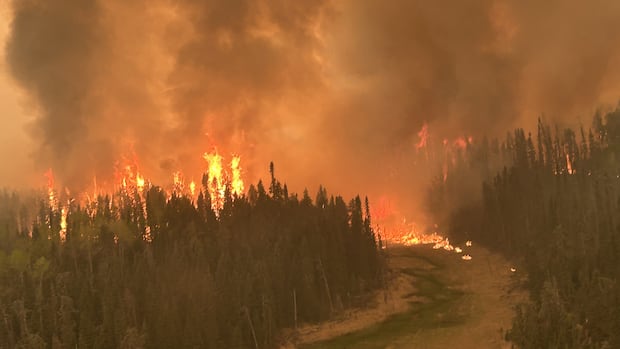Top Stories
Ontario Wildfire Crisis: Record Blaze Evacuates 800+ Residents

UPDATE: Ontario’s wildfire season has officially ended, leaving a devastating impact on communities in Northwestern Ontario. Over 800 residents from the Deer Lake First Nation were evacuated as the region dealt with the largest wildfire on record, prompting urgent responses from both local and national authorities.
Leonard Mamakeesic, chief of Deer Lake First Nation, highlighted the resilience of his community during the crisis. “The weeks dragged on and on, and the months started getting a little rough,” he stated. “People wanted to be home.” The community, located about 600 kilometres northwest of Thunder Bay, faced a harrowing summer as the Red Lake 12 wildfire threatened their homes.
This year, Ontario recorded a staggering 643 wildfires that scorched nearly 600,000 hectares (approximately 6,000 square kilometres), a sharp increase from last year’s 480 fires and 90,000 hectares burned. The escalation is alarming, especially considering that the province’s 10-year average is 712 fires.
As the summer unfolded, communities were put under emergency evacuation orders. The Canadian Armed Forces were deployed to assist, with members and aircraft evacuating thousands from remote First Nations to safer locations in southern Ontario and Winnipeg. The situation escalated when the Red Lake 12 wildfire peaked at over 196,000 hectares, prompting urgent evacuations in Deer Lake and Sandy Lake.
“Fires near human settlements require a robust response to both fight the fire and assist the communities in managing an emergency,” said Chris Marchand, a fire information officer with Ontario’s Ministry of Natural Resources.
In response to the crisis, Ontario plans to hire 68 permanent firefighting and support staff and invest over $500 million in new firefighting equipment, including six De Havilland DHC-515 waterbombers. However, these aircraft will not be operational until the early 2030s. “We need pilots and maintenance crews,” stated Ontario Minister of Natural Resources Mike Harris.
Despite the province’s response, staffing shortages were a significant concern this season. Reports indicated a lack of personnel forced some waterbombers to remain grounded due to insufficient pilots. The Ontario Public Service Employees Union (OPSEU) highlighted that members were operating with over 45 ground crews short, which translates to at least 135 positions unfilled.
Power outages further complicated the situation, affecting numerous communities and resulting in food spoilage and shortages of essential supplies. Authorities reported that fire damage to hydro poles left several areas without power for days.
As the season wrapped up, Mamakeesic expressed gratitude that no structures were lost in his community, despite the fire coming within 30 metres of their band office. He emphasized the importance of keeping evacuees together this time, unlike previous years when families were separated across various locations.
Looking ahead, Mamakeesic aims to explore better protection measures, such as firebreaks in forests, to mitigate future wildfire risks. Meanwhile, Marchand reiterated the need for continuous education on fire prevention, especially after such an extreme fire season.
This year’s wildfire crisis serves as a stark reminder of the urgent need for preparedness and proactive measures. With weather patterns changing and fire seasons becoming more severe, officials stress that communities must remain vigilant to protect lives and property.
As residents begin to return home, the focus shifts to recovery and rebuilding, ensuring that lessons learned from this summer are implemented for future fire seasons.
-

 World4 months ago
World4 months agoScientists Unearth Ancient Antarctic Ice to Unlock Climate Secrets
-

 Entertainment4 months ago
Entertainment4 months agoTrump and McCormick to Announce $70 Billion Energy Investments
-

 Lifestyle4 months ago
Lifestyle4 months agoTransLink Launches Food Truck Program to Boost Revenue in Vancouver
-

 Science4 months ago
Science4 months agoFour Astronauts Return to Earth After International Space Station Mission
-

 Technology2 months ago
Technology2 months agoApple Notes Enhances Functionality with Markdown Support in macOS 26
-

 Top Stories4 weeks ago
Top Stories4 weeks agoUrgent Update: Fatal Crash on Highway 99 Claims Life of Pitt Meadows Man
-

 Sports4 months ago
Sports4 months agoSearch Underway for Missing Hunter Amid Hokkaido Bear Emergency
-

 Politics3 months ago
Politics3 months agoUkrainian Tennis Star Elina Svitolina Faces Death Threats Online
-

 Politics4 months ago
Politics4 months agoCarney Engages First Nations Leaders at Development Law Summit
-

 Technology4 months ago
Technology4 months agoFrosthaven Launches Early Access on July 31, 2025
-

 Top Stories2 weeks ago
Top Stories2 weeks agoFamily Remembers Beverley Rowbotham 25 Years After Murder
-

 Top Stories7 days ago
Top Stories7 days agoBlake Snell’s Frustration Ignites Toronto Blue Jays Fan Fury





















